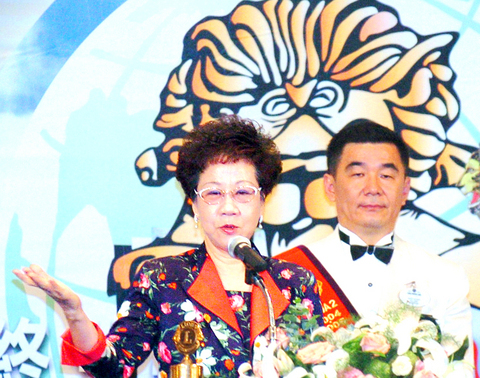Vice President Annette Lu (
Lien's trip to China weakened Taiwan's government, polarized the Taiwanese people, demeaned national sovereignty and created an illusion on an international stage, the vice president said. Her criticism came one day after the meeting between Lien and Chinese President Hu Jintao (
During their more than two hour meeting in Beijing on Friday, the two agreed to a five-point "vision for cross-strait peace" based on the so-called "1992 consensus."

PHOTO: FANG PIN-CHAO, TAIPEI TIMES
According to KMT spokesman Chang Jung-kung (
Stating that China has in recent years continued to boost its annual defense budget, Lu told the audience that the ballistic missiles China has deployed along its southeastern coast within striking distance of Taiwan has grown from two in 1996 to more than 700 now, adding that the number could very well increase to 800 or even a thousand by next year.
"Despite this situation, a demand for the removal of the ballistic missiles was not mentioned in the conversation between Chairman Lien and Mr. Hu, who merely talked about `peace.' This kind of vision of `peace' without substantial content reminds me of Zhang Ying (
Zhang was found guilty of fraud in 2002 and sentenced to one year and two months in prison.
Lu said that Lien, despite having served as vice president and premier in Taiwan, had avoided mentioning these facts during his speech at Peking University, nor did he mention the term "Republic of China" (ROC) at all, except when he laid a wreath at Sun Yat-sen's (孫中山) mausoleum in Nanjing.
"The Beijing authorities are the only people in the world who wish to wipe out the ROC," Lu said. "Lien, being the ROC's opposition party leader, who proclaims often he will safeguard the ROC's sovereignty, dared not speak about China's violation of human rights, but twisted Taiwan's democracy as populism in his speech in Peking University."
"When he was asked `what is the thing he wishes to do first upon returning to Taiwan,' he replied that he `hopes all could identify with the country.' To make that statement in Beijing, it is worth contemplating what country he was referring to," the vice president said in a speech at a Lion's Club meeting in Taipei.
She also dismissed the so-called "1992 consensus" on the "one China" principle mentioned in a news statement released after the Lien-Hu talks as non-existent.
Lu then called on the nation's people to heed the situation, stressing that the ROC is an independent, sovereign state whose sovereign rights belong to its 23 million people, and that any changes to the state quo can only be determined by its people.

CHAOS: Iranians took to the streets playing celebratory music after reports of Khamenei’s death on Saturday, while mourners also gathered in Tehran yesterday Iranian Supreme Leader Ayatollah Ali Khamenei was killed in a major attack on Iran launched by Israel and the US, throwing the future of the Islamic republic into doubt and raising the risk of regional instability. Iranian state television and the state-run IRNA news agency announced the 86-year-old’s death early yesterday. US President Donald Trump said it gave Iranians their “greatest chance” to “take back” their country. The announcements came after a joint US and Israeli aerial bombardment that targeted Iranian military and governmental sites. Trump said the “heavy and pinpoint bombing” would continue through the week or as long

TRUST: The KMT said it respected the US’ timing and considerations, and hoped it would continue to honor its commitments to helping Taiwan bolster its defenses and deterrence US President Donald Trump is delaying a multibillion-dollar arms sale to Taiwan to ensure his visit to Beijing is successful, a New York Times report said. The weapons sales package has stalled in the US Department of State, the report said, citing US officials it did not identify. The White House has told agencies not to push forward ahead of Trump’s meeting with Chinese President Xi Jinping (習近平), it said. The two last month held a phone call to discuss trade and geopolitical flashpoints ahead of the summit. Xi raised the Taiwan issue and urged the US to handle arms sales to

State-run CPC Corp, Taiwan (CPC, 台灣中油) yesterday said that it had confirmed on Saturday night with its liquefied natural gas (LNG) and crude oil suppliers that shipments are proceeding as scheduled and that domestic supplies remain unaffected. The CPC yesterday announced the gasoline and diesel prices will rise by NT$0.2 and NT$0.4 per liter, respectively, starting Monday, citing Middle East tensions and blizzards in the eastern United States. CPC also iterated it has been reducing the proportion of crude oil imports from the Middle East and diversifying its supply sources in the past few years in response to geopolitical risks, expanding

Pro-democracy media tycoon Jimmy Lai’s (黎智英) fraud conviction and prison sentence were yesterday overturned by a Hong Kong court, in a surprise legal decision that comes soon after Lai was jailed for 20 years on a separate national security charge. Judges Jeremy Poon (潘兆初), Anthea Pang (彭寶琴) and Derek Pang (彭偉昌) said in the judgement that they allowed the appeal from Lai, and another defendant in the case, to proceed, as a lower court judge had “erred.” “The Court of Appeal gave them leave to appeal against their conviction, allowed their appeals, quashed the convictions and set aside the sentences,” the judges